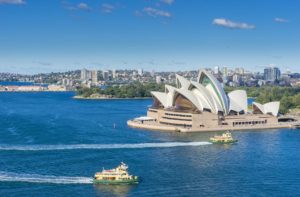Immigration updates for Australia, China, Netherlands and other
Americas
United States: President Biden revokes travel bans
On January 20, President Biden revoked travel bans for Muslim-majority and African countries proclaimed by the former President, Donald Trump (Executive Order 13780 and Proclamations 9645, 9723 and 9983).
The State Department is now responsible for ensuring that immigrant visas denied under the ban are re-considered and prior denials under the ban will not affect visa applicants if they re-apply.
This summary was prepared using information obtained from the White House.
Disclaimer: The above information is provided for general information purposes only and should not be construed as legal advice. If you have any further inquiries regarding the applicability of this information, please contact Roberta Carnaccini, Global Operations Director, Immigration.
Asia-Pacific
Australia: Entry requirements announced
Entry to Australia is permitted if travelers:
- Are in an exempt category.
- Have been granted an individual exemption to the current travel restrictions.
All travelers must complete and provide a negative Covid-19 test within 72 hours of departure (we recommend contacting airlines regarding testing requirements). Unless arriving on a quarantine-free flight from New Zealand, all travelers (including Australian citizens) must quarantine for 14 days at a designated facility.
Click here to find more details about the travel restrictions, exemptions and individual exemptions, compassion and compelling reasons to travel.
Further Covid-19 updates across all states and territories in Australia: Australian Capital Territory, New South Wales, Northern Territory, Queensland, South Australia, Tasmania, Victoria, Western Australia, Norfolk Island, Christmas Island and the Cocos (Keeling) Islands.
This summary was prepared using information obtained from the Australian Government and Department of Home Affairs.
China: Beijing adjusts quarantine to 14+7+7
Overseas arrivals landing in Beijing must follow the guidelines below:
- 14-days’ central quarantine in a designated hotel.
- Seven days’ quarantine at home for those with a Beijing residence or continued hotel quarantine; the home quarantine is subject to prior approval from the authorities.
- Seven days’ health monitoring; personnel must report their health condition and are encouraged to minimize going out but could be permitted short periods outside for necessities. The final decision sits with the residential committee.
Domestic arrivals from low-risk areas:
- Arrivals who have already completed 21 days outside of Beijing will need to make up the last seven days of health monitoring upon entry. The Beijing residential committee has the final decision for actual implementation.
- Those entering without having completed 21 days elsewhere are required to make up the seven days’ hotel/home quarantine and seven days’ health monitoring.
Domestic arrivals coming from medium/high-risk areas:
- Movement from medium and high-risk regions is strictly controlled and only permitted for important official or personal emergency reasons.
- Prior approval is required from the local Epidemic and Control Prevention Department (当地省级疫情防控部门) and the Beijing Office of Joint Prevention and Control (首都严格进京管理联防联控协调机制办公室), as well as reporting to the employer, residential committee.
- A negative nucleic acid test report issued within 72 hours of embarking on the trip is also required.
Applications for a Beijing Residence Permit will only be accepted after completing the initial 14+7 quarantine requirements.
No source available at the time of writing.
Vietnam: Decree 152 implemented affecting foreign national workers
On February 15, 2021, Decree 152/2020/ND-CP (Decree 152), which combines regulations relating to foreign nationals working in Vietnam (Decree 11/2016/ND-CP) and the recruitment and management of Vietnamese citizens working for foreign organizations and individuals in Vietnam (Decree 75/2014/ND-CP), will come into force replacing all earlier decrees. Decree 152 does not significantly change the content of the previous decrees but aims to better align the provisions with the Labor Code 2019.
The main changes are:
- Experts and specialists will require:
- Minimum of three years’ work experience and a bachelor’s degree or higher qualification relevant to the job.
- Minimum of five years’ relevant work experience and Practicing Certificate.
- Foreign nationals entering for short-term assignments will not require a Work Permit if the assignment is less than 30-days per trip and does not exceed three times per year.
- Foreign national spouses of Vietnamese nationals will no longer require a Work Permit. However, a corporate sponsored work permit exemption and a spouse/corporate sponsored temporary residence card is required to remain in Vietnam.
Employers will need to report all foreign nationals who are exempt from work authorization to the government.
This information was prepared using information obtained from the European Chamber of Commerce in Vietnam.
Disclaimer: The above information is provided for general information purposes only and should not be construed as legal advice. If you have any further inquiries regarding the applicability of this information, please contact Debra Jane Beynon, Regional Immigration Manager (APAC).
Europe, Middle East and Africa
Netherlands: Additional travel restrictions
The Dutch government has introduced extra measures to restrict the number of travel movements and prevent new variants of the virus entering the Netherlands.
Bans for flights and ferries from the U.K. are in force. Additionally, flight bans exist for passengers from the following countries: Argentina, Bolivia, Brazil, Cabo Verde, Chile, Colombia, Ecuador, French Guiana, Guyana, Panama, Paraguay, Peru, South Africa, Suriname, Uruguay and Venezuela. The flight ban is expected to remain for one month or until planned legislation on mandatory quarantine rules for travelers are in place.
Air or sea passengers traveling to the Netherlands from high-risk areas must be able to provide a negative Covid-19 result. This must be taken more than four hours prior to boarding the aircraft or ship. This requirement is in addition to the existing mandatory negative test result for a Polymerase Chain Reaction (PCR) test taken no more than 72 hours before arrival in the Netherlands. These measures also apply to people traveling to the Caribbean parts of the Netherlands.
Since rapid test facilities are not available near all ports and airports, the government expects that the double test requirement will reduce the amount of travel to the Netherlands. As a result, it may be difficult for some people to get home. Dutch nationals who have a compelling reason to travel to the Netherlands and cannot produce a negative PCR and Covid-19 test result in time should contact the Ministry of Foreign Affairs.
Travelers must self-quarantine for ten days upon arrival. After five days they can get tested and if the result is negative, they may end their self-quarantine.
No source available at the time of writing.
Disclaimer: The above information is provided for general information purposes only and should not be construed as legal advice. If you have any further inquiries regarding the applicability of this information, please contact Laxmi Vikraman, Regional Immigration Manager (EMEA).
We track policy changes in over 120 countries. Find out how we can help you in this short video.




